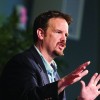I’m a big believer in recovery from addiction. I’ve seen the power of recovery among friends and family.
Yet, I’m also a Christian, and an evangelical one, passionate about the gospel.
So, as we talk about recovery and higher powers, I’m convinced that the power of the gospel is what matter most.
Yet, many people in our culture claim to be Christians but have never heard a comprehensive gospel message. Therefore, discipleship—in general—and recovery ministry in our churches—more specifically—must begin by laying the foundation of what Jesus has accomplished on the cross for those who believe (gospel truths) and then bid people to live out the call to follow Christ (gospel imperatives).
As disciples, part of the sanctification process is examining our hearts before the Lord. This process of personal assessment involves confession and prayer about the fruit of our lives and its roots. We bring all this before the Lord so that He can uproot our sinful patterns and heal our hearts, freeing us to act faithfully for His kingdom.
People both inside and outside of our churches need help breaking sinful patterns in their lives. Our culture offers various ways to cope with addictions and issues, but only the gospel offers real freedom and transformation.
As I see it, a gospel-centered recovery ministry must first engage with the traditional 12 Steps, which have saved millions of lives and pulled people out of all sorts of destructive behaviors and addictions. However, evangelical Christians can take the 12 Steps and use them as a foundation upon which they may build a more gospel-centered means of recovery.
“For freedom Christ has set us free; stand firm therefore, and do not submit again to a yoke of slavery” Galatians 5:1
The message of the gospel is both comfort and call. It presents the comforting truth that in Christ we have been forgiven and made righteous. We are now sons and daughters of God and accepted into His kingdom for eternity, not because of any worth or work of our own but because of the loving choice of the Father and the sacrifice of the Son.
The gospel also offers us, as citizens of the kingdom, a call—a call to come and die, to forsake everything for the expansion of the kingdom of God, and to push back what is dark in the world. This call bids us to throw off the old self and clothe ourselves with the new self.
With my appreciation of traditional recovery, but a passion for gospel-centrality, I was excited to see the Village Church create resources for gospel-centered recovery.
The mission of the Steps Bible Study fits into the church’s greater mission of bringing glory to God by making disciples through gospel-centered worship, gospel-centered community, gospel-centered service, and gospel-centered multiplication. Steps is an intensive discipleship program that consists of daily Bible study and reflection, one-on-one discipleship, sharing in small groups, and a large-group teaching time.
This study does not offer an attempt to climb a staircase to God through a religious system but rather the pursuit of obedience in faithful response to what God has already accomplished and promised through the gospel.
This post was originally published on Christianity Today.






















